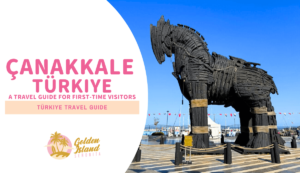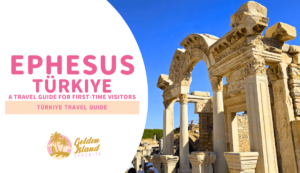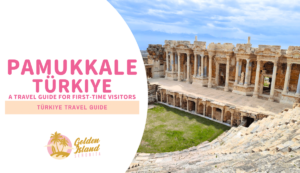Turkey, a vibrant country where the beauty of the past blends seamlessly with the pulse of the modern world. Situated at the crossroads of Europe and Asia, Turkey offers a unique fusion of cultures, history, and landscapes that are as diverse as its people. From the bustling streets of Istanbul to the ancient ruins of Ephesus, and to the surreal landscapes of Cappadocia, Turkey has something for every traveler.
Whether you’re a history buff, a foodie, or a nature lover, this dynamic destination promises to enchant you with its warm hospitality, world-famous cuisine, and stunning sights. In this travel guide, we’ll explore everything you need to know before embarking on your Turkish adventure— from visa requirements and travel essentials to tips on navigating the rich cultural tapestry that makes Turkey truly unforgettable.

Travel Essentials for Visitors
VISA POLICY
Before planning your Turkish adventure, check the visa requirements for your country. Turkey offers several visa options depending on the purpose of your visit and your nationality.
- Tourist Visa which can either be or Sticker-Type or an E-Visa.
- The main difference between a sticker-type Turkish visa and an e-visa is that the former is a traditional visa that is issued on a physical document, whereas the latter is an electronic version of the visa that is available for certain nationalities and can be completed online.
- A sticker-type Turkish visa is typically issued on a paper document that needs to be attached to a valid passport, while an e-visa is processed entirely online and delivered electronically, usually in PDF format for printing. While both types of visas allow holders to enter and stay in Turkey, the e-visa is usually more convenient and faster to obtain.
- Visa-Free Entry: Citizens of certain countries, including those from the EU, Japan, and Brazil, can enter Turkey without a visa for stays up to 90 days.
- Visa on Arrival: Some visitors are eligible to obtain a visa upon arrival at Turkish airports, though applying online in advance is recommended for a smoother process.
You can check your eligibility and apply for an e-Visa through the official Turkish e-Visa website.
TRAVEL INSURANCE
Travel insurance is highly recommended for anyone visiting Turkey. A comprehensive travel insurance policy should cover medical expenses, emergency evacuations, lost luggage, and trip cancellations. Many visa types require proof of travel insurance, so it’s good to have a policy in place before applying for your visa.
Geography
LOCATION
Turkey is a transcontinental country, straddling both Europe and Asia. The majority of the country is located in Asia, with a smaller portion in southeastern Europe. It is bordered by several countries, including Syria, Iraq, Iran, Bulgaria, Greece, and the Black Sea.
The country has a stunning coastline of 8,333 kilometers in length, stretching along four captivating seas. The Mediterranean Sea to the south, the Black Sea to the north, the Aegean Sea to the west, and the Marmara Sea, which is connected to the Black Sea via the majestic Bosphorus Strait and the Aegean Sea.
- Capital City: Ankara, though Istanbul, the country’s largest city, often takes the spotlight as Turkey’s cultural and economic center.
WEATHER
Turkey’s weather varies significantly across its regions due to its vast size and diverse landscapes. Along the Mediterranean and Aegean coasts, the climate is typically Mediterranean, with hot, dry summers and mild, rainy winters. In contrast, the interior, particularly around Central Anatolia, experiences a more continental climate, with hot summers and cold, snowy winters. The Black Sea region, meanwhile, enjoys a more temperate, rainy climate throughout the year. The best time to visit Turkey depends on your interests, but generally, spring (April to June) and fall (September to November) offer pleasant temperatures, fewer crowds, and ideal conditions for exploring historical sites, hiking, or enjoying the coast.
Demographics
LANGUAGE
The official language of Turkey is Turkish, which is spoken by the majority of the population. In tourist-heavy areas, English is widely spoken, especially in hotels, restaurants, and touristic sites. Learning a few basic Turkish phrases, such as “Günaydın” (Good Morning) and “Teşekkür” (Thank you), can go a long way in enhancing your travel experience.
RELIGION
Turkey is a secular state with Islam as the predominant religion. Approximately 95% of the population identifies as Muslim, mainly following the Sunni tradition. That said, Turkey’s secular constitution ensures freedom of religion, and various religious communities coexist peacefully.
- Cultural Respect: When visiting mosques, it’s customary to dress modestly and remove your shoes before entering. Women may be asked to cover their heads with a scarf.
Infrastructure
CONNECTIVITY
Turkey offers excellent connectivity options for travelers:
- Wi-Fi: Available in most hotels, cafes, and restaurants, especially in major cities and tourist areas.
- SIM Cards: Purchasing a local SIM card is a convenient way to stay connected. Turkcell, Vodafone, and Türk Telekom are the main telecom providers. You can easily purchase prepaid SIM cards at the airport or in city shops.
TRANSPORTATION
Turkey has a well-established transportation system offering several options for travel.
- The most commonly used form of transport is the bus network. With routes covering the entire country, buses are affordable and reliable, making them the go-to choice for long-distance travel between cities and regions.
- Domestic air travel in Turkey has become increasingly popular due to the convenience and competitive prices offered by airlines. Major cities like Istanbul, Ankara, and Izmir are connected to numerous regional airports, making air travel a preferred option for crossing long distances quickly.
- Trains are also an important part of Turkey’s transportation system. The high-speed rail services, particularly between major cities like Istanbul and Ankara, are efficient and growing in popularity, although they are not as widespread as bus or air travel.
- In urban areas, metro systems and trams play a key role, especially in cities like Istanbul, Ankara, and Izmir, where they provide fast and convenient transport across densely populated areas. They are essential for local commuters and tourists navigating the city.
- Taxis and ride-hailing services, such as BiTaksi, are frequently used for short distances within cities. These services offer flexibility and convenience, particularly when public transport options are limited or unavailable.
- Ferry services are vital in cities like Istanbul, where they link the European and Asian sides, as well as in coastal areas. While not as widely used as buses or flights, they offer scenic and practical transport across waterways.
- Lastly, bicycles are the least commonly used form of transport in Turkey. Although some coastal areas and tourist cities are becoming more bike-friendly, biking is not widespread due to limited infrastructure and challenging terrain in many regions of the country.
SOCKETS AND ADAPTERS
Turkey uses Type C and Type F power sockets, with a standard voltage of 230V and a frequency of 50Hz. If you’re traveling from the US or other countries using different plug types, be sure to bring an adapter.
Culture and Society
CUISINE
Turkish cuisine is renowned for its diversity and flavor. Some must-try dishes include:
- Kebabs: A wide variety of grilled meats, with the Adana kebab and Doner kebab being local favorites.
- Mezes: Small plates served as appetizers
- Baklava: A sweet pastry made of layers of filo dough, filled with nuts and soaked in syrup.
- Turkish Tea & Coffee: Both beverages are an integral part of Turkish hospitality and are served throughout the day.
TOURISM
Tourism is a major industry in Turkey, with millions of visitors each year.
- Historical Sites: Turkey is home to some of the world’s most famous archaeological and historical landmarks, including Ephesus, Cappadocia, and Pamukkale.
- Istanbul: A melting pot of cultures, Istanbul boasts iconic sites such as the Hagia Sophia, Blue Mosque, and Topkapi Palace.
Finance
CURRENCY
The official currency of Turkey is the Turkish Lira (TRY). While credit and debit cards are widely accepted in urban areas, it’s advisable to carry cash, especially when traveling to smaller towns or rural areas.
BANKS AND ATMs
ATMs are widespread in Turkey and most accept international cards. Banks and ATMs can be found in cities, towns, and tourist hotspots. When withdrawing cash, it’s a good idea to use ATMs located inside bank branches for added security.
- Tipping: Tipping is customary in Turkey. In restaurants, a 10% tip from your total bill is appreciated, while hotel staff and drivers (or those who are in the service sector) may expect smaller amounts.

- CANAKKALE, TÜRKIYE: A Comprehensive Travel Guide for First-Time Visitors
- EPHESUS, TÜRKIYE: A Comprehensive Travel Guide for First-Time Visitors
- PAMUKKALE, TÜRKIYE: A Comprehensive Travel Guide for First-Time Visitors





